#The Acting Manager
Text
People do not talk enough about how amazing Lae'zels voice acting is. Devora Wilde put her whole ass pussy into some of those lines but nobody pays attention and calls laezel one note and angry. But have you listened? Have you heard her voice shake as she cries "what good - this heart of stone - for it to be shattered?" Have you heard the conviction where she declares that Vlaketh has sinned against her? Have you listened to the fear in her voice, the slight tremble when she is talking of becoming a mindflayer and the way that she has utter awe in her tones when she experiences something that is truly spiritual to her? Like. It's such a subtle and great performance.
#bg3#lae'zel#the other voice actors are also incredible#wylls voice actor creates the charming prince so easily#but still manages the tough moments#karlachs act 3 gortash dead speech and the pain in that???#astarion gets all the praise anyway i dont gotta mention him#and gale and SHADOWHEART#god#such good performances in this game
8K notes
·
View notes
Text
Dc x dp idea 133
Danny is really confused. Like sure he made a fake account in order “use” his parents completely valid and not in biased research on ghosts.
Cause obviously. Their completely legit research disproves multiple peer reviewed and factual papers.
Tucker made the fake account. No real names or numbers. So. They couldn’t know it was him right?!??
He just wanted people to see how wack the papers were and bring to light the very not accurate papers. He figured using botched research to counter claim others would do something.
But??? Why was the flash in his living room arguing with his parents about scientific articles. And proper research??
#dpxdc#dpxdc prompt#dcxdp crossover#Danny managed to piss off thenscience community#fentons are making a mockery of it#the papers were getting flack#but a look at the fentonWorks website caused the investigation#they mentioned some experiments#some pretty unethical things#which turned into a violation of the anti meta acts#and given the security system that no one could disable#it’s enfused with ecto#then the weapons destruction trail via social media#well. best to send some hero’s#flash just has personal beef with the fentons
4K notes
·
View notes
Text
lol arthur realizes with the other knights after watching merlin flirt and being hit with a wave of deja vu: holy shit you asked me out
merlin and the rest of the knights around a campfire after leaving a village bc lancelot and leon somehow started a brawl in the tavern: ???
arthur points at merlin: after valiant! you asked me to buy you a drink! you were asking me out!
merlin is busy cooking dinner and confused out of his fucking mind: what???…..valiant….oh the knight with the snakes.
gwaine who was slightly tipsy now stone cold sober and sitting up straight against a tree: wait. explain. what do you mean merlin asked you out??
arthur snaps his fingers as he recalls the memory: i apologized for sacking you and you said that if i bought you a drink we’d be even.
merlin now remembering how he had stumbled into camelot, picked a fight with a pigheaded bully which quickly turned homoerotic and flirtatious, and continued their teasing-flirting for days before merlin shot his shot and asked the prince out only to be rejected: oh yeah, i forgot i did that…..wait, you mean you didnt realize what i was asking?
arthur: no?? we argued everyday, how was i supposed to realize you were asking me out??
merlin now abandoning the dinner and staring across the camp at arthur while the rest of the knights watch their back and forth like a game of tennis: to you we were arguing, to me that was very much flirting. i thought you were flirting back so i decided to ask you. then you rejected me
arthur, mentally beating his past self up for fucking up their chance: i didn’t reject you!!! i just didn’t realize what you were asking me. how was i meant to? we fought every chance we got
leon, nudging elyan, glee and excitement riling through him: its happening!!! its finally happening!!! seven long, grueling years is finally paying off!!!
merlin, realizing the misunderstanding and acknowledging the fact that he wasn’t rejected, his flirtations just weren’t noticed - realizing he still has a chance: oh…oh i see. arthur, my dear, our fights were extremely flirtatious. need i remind you of what you said? “do you know how to walk on your knees? would you like me to teach you?” or “i could take you apart with one blow”
arthur, mental capabilities at an all time low: m…my dear….?????????
merlin grinning devilishly as he realizes that his flirtatious persona he had hidden away after falling head over heels for arthur can make a come back: that is what i called you. should i call you something else? say…mine?
percival gags in elyan’s ear: cheesy
elyan hides a laugh: at least they’re finally getting somewhere. better than the hopeless pining
arthur, flushed from head to toe: ah uh no um im uh
merlin thoroughly enjoying himself: oh come now, your majesty. use your words.
#meanwhile leon is praying his thanks to every god and goddess above for their mercy#his pain and suffering is so over#merlin is going IN on arthur who is red as fuck#gwaine is enjoying himself immensely#lancelot pulls out popcorn to watch the two idiots finally get their acts together#flirty merlin x flustered arthur#i think yes#listen. merlin lived in ealdor. a small village of maybe thirty people - four or five being his own age#he was thrilled to be in camelot and have new faces and people to meet#he was definitely the village tease or flirt or whatever#he was gonna be a rake in camelot but unfortunately managed to fall hopelessly in love with the prince of camelot#he burned his dreams of being a rake in exchange for arthur#the issue? arthur rejected his advances. next issue? merlin’s feelings remained and grew#so merlin is a lovesick puppy for a prince who doesnt feel the same and he cant find it in himself to look at anyone else bar a few cases#he and lancelot def slept together at least once. him and gwaine tumbled into bed a few times together#but his heart always belonged to arthur he just never imagined hed get a chance to let his affection be known#now that he knows arthur never knew of his intentions in the first place and was quick to deny he rejected him#merlin is more than happy to let that part of his personality come back and terrorize arthur is a way he hadnt been able to before#hes living his best life rn#bbc merlin#merlin emrys#arthur pendragon#merthur#knights of the round table#fanfiction ideas#prompts#headcanon
1K notes
·
View notes
Text

Who's the "real" me?
+ some references for the Rise-related things I included <3








#im reaaaally happy with this one hehe i had fun putting the stuff from different things shes had/worn#i feel like ppl overlook the massive identity crisis & the accompanying depression & internal conflict rise is going through during the gam#like shes trying to figure out who she is seperate from her idol image (which she constantly still clings to despite her insistance that sh#s done with it bc she does still crave that recognition and attention she got from that position. she literally breaks down crying when her#manager tells her kanami has taken her acting role and is more-or-less set to take her spot now)#and then she also struggles with finding what she wants to do with herself now that she doesnt have showbiz to worry about#i think she kinda unintentionally uses the investigation as an anchor for her to hold onto#something to keep her busy in the absence of the hustling idol life#and then she also like. again she keeps clinging to the idol image and the associated bubbly-ness and bold flirtation#because thats the ''her'' ppl liked#i dont think the way she acts during the game is ENTIRELY an act theres definitely a lot of her true self in it too#but she does have a lot of moments where she leans more heavily into the bubbly & flirty cutie act#her sl shows that for all that she wanted to retire from showbiz she isnt really ready just yet#bc she did actually enjoy being an idol. she did enjoy being able to reach out to people in this way & to finally have ppl like & accept he#the problem is she doesnt know who ''she'' is at this point#im rambling but u get my point. yeah. yeah#rise..............#rise kujikawa#persona#persona 4#p4#art#my art#xanders art#digital art#fan art
558 notes
·
View notes
Text



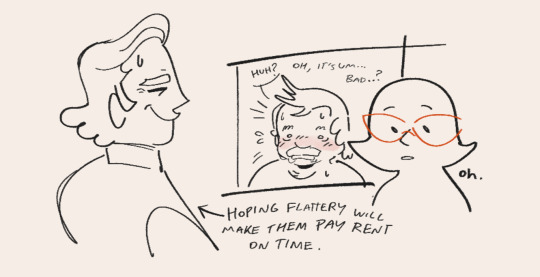
#I imagine he’s he’s bad at complimenting out of the blue#like we’ve seen he’s pretty good at genuine ones but I imagine he’s too socially inept to give out casual flattery#calvin fischoeder#bobs burgers#like this ain’t even complimenting I imagine all he could manage is to act… sweeter? less brash maybe?#belchoeder
977 notes
·
View notes
Text
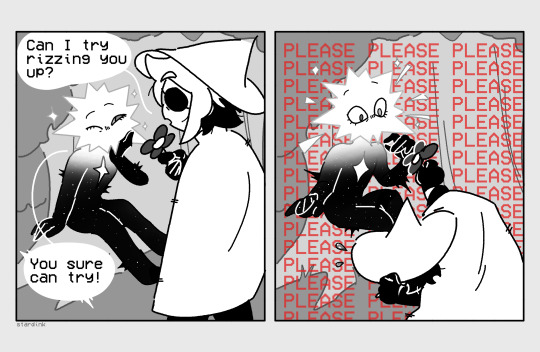
"Loop. The tax benefits if we get bonded. Think about it, Loop pleASE-"
Ref:
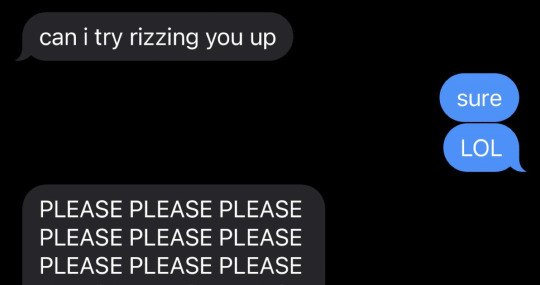
#isat siffrin#isat loop#isat#sifloop#sloop#in stars and time#isat art#my art#did anyone else manage to pester loop into accepting the flower#as soon as they realised they could show loop their items?#because i did#i kept trying every act and the EXCITEMENT AND PURE JOY I FELT WHEN LOOP FINALLY TOOK IT TO SHUT ME UP-#so yeah this comic is canon to my playthrough#LOOP LET SIFFRIN FLIRT WITH YOU PLEASE PLEASE PLEASE LOOP THE TAX BENEFITS-#then I kept giving loop the flower and they'd just take it without even asking for a divorce! improvement!#i am feral for these two i am feeding them dog treats as we speak
603 notes
·
View notes
Text
the difference between karkat and kankri when it comes to their shared aspect of blood is that karkat, as a knight, will protect and cultivate the bonds between his friends and will form connections with others easily due to his empathetic nature, even if said others are fucked up people in the eyes of others (see: his whole deal with spades slick, the way he formed moriallegience with rampaging gamzee), people naturally come into his orbit, meanwhile kankri being a seer doesnt want to create a connection between himself and others, but he wants to understand and study how those bonds work between people, basically looking outside in on the relationships and forming a list of do's and dont's when it comes to cultivating that connection
in other words, karkats that one motherfucker at the party whos somehow friends with everyone here, no matter their background, and everyone fucking loves that foul-mouthed guy, meanwhile kankri is standing in the corner like a creep and nobody knows exactly what his deal is but he knows what everyones deal is and somehow has knowledge of all of partygoers dirty laundry, even if theyve never seen him in their fucking life
#homestuck#kankri vantas#karkat vantas#karkats agressive appreciation of his friends vs kankris stalker-ish tendency to dig into everyones business#this doesnt touch upon the fact that kankris metatextually IS a failed seer but thats a post for another day#i love the dichotomy between these two and how much differently they use their aspect when it comes to group bonding#fascinating stuff#do you think kankris jealous about how easily karkat can make friends when his own act only manages to push people away#i think he is very much yes
601 notes
·
View notes
Text
Copyright takedowns are a cautionary tale that few are heeding
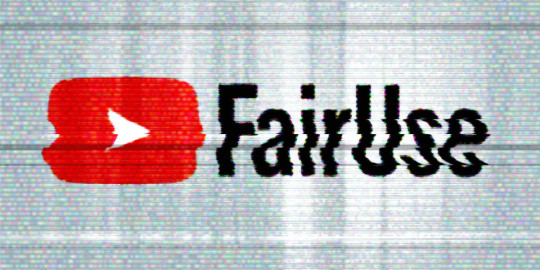
On July 14, I'm giving the closing keynote for the fifteenth HACKERS ON PLANET EARTH, in QUEENS, NY. Happy Bastille Day! On July 20, I'm appearing in CHICAGO at Exile in Bookville.

We're living through one of those moments when millions of people become suddenly and overwhelmingly interested in fair use, one of the subtlest and worst-understood aspects of copyright law. It's not a subject you can master by skimming a Wikipedia article!
I've been talking about fair use with laypeople for more than 20 years. I've met so many people who possess the unshakable, serene confidence of the truly wrong, like the people who think fair use means you can take x words from a book, or y seconds from a song and it will always be fair, while anything more will never be.
Or the people who think that if you violate any of the four factors, your use can't be fair – or the people who think that if you fail all of the four factors, you must be infringing (people, the Supreme Court is calling and they want to tell you about the Betamax!).
You might think that you can never quote a song lyric in a book without infringing copyright, or that you must clear every musical sample. You might be rock solid certain that scraping the web to train an AI is infringing. If you hold those beliefs, you do not understand the "fact intensive" nature of fair use.
But you can learn! It's actually a really cool and interesting and gnarly subject, and it's a favorite of copyright scholars, who have really fascinating disagreements and discussions about the subject. These discussions often key off of the controversies of the moment, but inevitably they implicate earlier fights about everything from the piano roll to 2 Live Crew to antiracist retellings of Gone With the Wind.
One of the most interesting discussions of fair use you can ask for took place in 2019, when the NYU Engelberg Center on Innovation Law & Policy held a symposium called "Proving IP." One of the panels featured dueling musicologists debating the merits of the Blurred Lines case. That case marked a turning point in music copyright, with the Marvin Gaye estate successfully suing Robin Thicke and Pharrell Williams for copying the "vibe" of Gaye's "Got to Give it Up."
Naturally, this discussion featured clips from both songs as the experts – joined by some of America's top copyright scholars – delved into the legal reasoning and future consequences of the case. It would be literally impossible to discuss this case without those clips.
And that's where the problems start: as soon as the symposium was uploaded to Youtube, it was flagged and removed by Content ID, Google's $100,000,000 copyright enforcement system. This initial takedown was fully automated, which is how Content ID works: rightsholders upload audio to claim it, and then Content ID removes other videos where that audio appears (rightsholders can also specify that videos with matching clips be demonetized, or that the ad revenue from those videos be diverted to the rightsholders).
But Content ID has a safety valve: an uploader whose video has been incorrectly flagged can challenge the takedown. The case is then punted to the rightsholder, who has to manually renew or drop their claim. In the case of this symposium, the rightsholder was Universal Music Group, the largest record company in the world. UMG's personnel reviewed the video and did not drop the claim.
99.99% of the time, that's where the story would end, for many reasons. First of all, most people don't understand fair use well enough to contest the judgment of a cosmically vast, unimaginably rich monopolist who wants to censor their video. Just as importantly, though, is that Content ID is a Byzantine system that is nearly as complex as fair use, but it's an entirely private affair, created and adjudicated by another galactic-scale monopolist (Google).
Google's copyright enforcement system is a cod-legal regime with all the downsides of the law, and a few wrinkles of its own (for example, it's a system without lawyers – just corporate experts doing battle with laypeople). And a single mis-step can result in your video being deleted or your account being permanently deleted, along with every video you've ever posted. For people who make their living on audiovisual content, losing your Youtube account is an extinction-level event:
https://www.eff.org/wp/unfiltered-how-youtubes-content-id-discourages-fair-use-and-dictates-what-we-see-online
So for the average Youtuber, Content ID is a kind of Kafka-as-a-Service system that is always avoided and never investigated. But the Engelbert Center isn't your average Youtuber: they boast some of the country's top copyright experts, specializing in exactly the questions Youtube's Content ID is supposed to be adjudicating.
So naturally, they challenged the takedown – only to have UMG double down. This is par for the course with UMG: they are infamous for refusing to consider fair use in takedown requests. Their stance is so unreasonable that a court actually found them guilty of violating the DMCA's provision against fraudulent takedowns:
https://www.eff.org/cases/lenz-v-universal
But the DMCA's takedown system is part of the real law, while Content ID is a fake law, created and overseen by a tech monopolist, not a court. So the fate of the Blurred Lines discussion turned on the Engelberg Center's ability to navigate both the law and the n-dimensional topology of Content ID's takedown flowchart.
It took more than a year, but eventually, Engelberg prevailed.
Until they didn't.
If Content ID was a person, it would be baby, specifically, a baby under 18 months old – that is, before the development of "object permanence." Until our 18th month (or so), we lack the ability to reason about things we can't see – this the period when small babies find peek-a-boo amazing. Object permanence is the ability to understand things that aren't in your immediate field of vision.
Content ID has no object permanence. Despite the fact that the Engelberg Blurred Lines panel was the most involved fair use question the system was ever called upon to parse, it managed to repeatedly forget that it had decided that the panel could stay up. Over and over since that initial determination, Content ID has taken down the video of the panel, forcing Engelberg to go through the whole process again.
But that's just for starters, because Youtube isn't the only place where a copyright enforcement bot is making billions of unsupervised, unaccountable decisions about what audiovisual material you're allowed to access.
Spotify is yet another monopolist, with a justifiable reputation for being extremely hostile to artists' interests, thanks in large part to the role that UMG and the other major record labels played in designing its business rules:
https://pluralistic.net/2022/09/12/streaming-doesnt-pay/#stunt-publishing
Spotify has spent hundreds of millions of dollars trying to capture the podcasting market, in the hopes of converting one of the last truly open digital publishing systems into a product under its control:
https://pluralistic.net/2023/01/27/enshittification-resistance/#ummauerter-garten-nein
Thankfully, that campaign has failed – but millions of people have (unwisely) ditched their open podcatchers in favor of Spotify's pre-enshittified app, so everyone with a podcast now must target Spotify for distribution if they hope to reach those captive users.
Guess who has a podcast? The Engelberg Center.
Naturally, Engelberg's podcast includes the audio of that Blurred Lines panel, and that audio includes samples from both "Blurred Lines" and "Got To Give It Up."
So – naturally – UMG keeps taking down the podcast.
Spotify has its own answer to Content ID, and incredibly, it's even worse and harder to navigate than Google's pretend legal system. As Engelberg describes in its latest post, UMG and Spotify have colluded to ensure that this now-classic discussion of fair use will never be able to take advantage of fair use itself:
https://www.nyuengelberg.org/news/how-explaining-copyright-broke-the-spotify-copyright-system/
Remember, this is the best case scenario for arguing about fair use with a monopolist like UMG, Google, or Spotify. As Engelberg puts it:
The Engelberg Center had an extraordinarily high level of interest in pursuing this issue, and legal confidence in our position that would have cost an average podcaster tens of thousands of dollars to develop. That cannot be what is required to challenge the removal of a podcast episode.
Automated takedown systems are the tech industry's answer to the "notice-and-takedown" system that was invented to broker a peace between copyright law and the internet, starting with the US's 1998 Digital Millennium Copyright Act. The DMCA implements (and exceeds) a pair of 1996 UN treaties, the WIPO Copyright Treaty and the Performances and Phonograms Treaty, and most countries in the world have some version of notice-and-takedown.
Big corporate rightsholders claim that notice-and-takedown is a gift to the tech sector, one that allows tech companies to get away with copyright infringement. They want a "strict liability" regime, where any platform that allows a user to post something infringing is liable for that infringement, to the tune of $150,000 in statutory damages.
Of course, there's no way for a platform to know a priori whether something a user posts infringes on someone's copyright. There is no registry of everything that is copyrighted, and of course, fair use means that there are lots of ways to legally reproduce someone's work without their permission (or even when they object). Even if every person who ever has trained or ever will train as a copyright lawyer worked 24/7 for just one online platform to evaluate every tweet, video, audio clip and image for copyright infringement, they wouldn't be able to touch even 1% of what gets posted to that platform.
The "compromise" that the entertainment industry wants is automated takedown – a system like Content ID, where rightsholders register their copyrights and platforms block anything that matches the registry. This "filternet" proposal became law in the EU in 2019 with Article 17 of the Digital Single Market Directive:
https://www.eff.org/deeplinks/2018/09/today-europe-lost-internet-now-we-fight-back
This was the most controversial directive in EU history, and – as experts warned at the time – there is no way to implement it without violating the GDPR, Europe's privacy law, so now it's stuck in limbo:
https://www.eff.org/deeplinks/2022/05/eus-copyright-directive-still-about-filters-eus-top-court-limits-its-use
As critics pointed out during the EU debate, there are so many problems with filternets. For one thing, these copyright filters are very expensive: remember that Google has spent $100m on Content ID alone, and that only does a fraction of what filternet advocates demand. Building the filternet would cost so much that only the biggest tech monopolists could afford it, which is to say, filternets are a legal requirement to keep the tech monopolists in business and prevent smaller, better platforms from ever coming into existence.
Filternets are also incapable of telling the difference between similar files. This is especially problematic for classical musicians, who routinely find their work blocked or demonetized by Sony Music, which claims performances of all the most important classical music compositions:
https://pluralistic.net/2021/05/08/copyfraud/#beethoven-just-wrote-music
Content ID can't tell the difference between your performance of "The Goldberg Variations" and Glenn Gould's. For classical musicians, the best case scenario is to have their online wages stolen by Sony, who fraudulently claim copyright to their recordings. The worst case scenario is that their video is blocked, their channel deleted, and their names blacklisted from ever opening another account on one of the monopoly platforms.
But when it comes to free expression, the role that notice-and-takedown and filternets play in the creative industries is really a sideshow. In creating a system of no-evidence-required takedowns, with no real consequences for fraudulent takedowns, these systems are huge gift to the world's worst criminals. For example, "reputation management" companies help convicted rapists, murderers, and even war criminals purge the internet of true accounts of their crimes by claiming copyright over them:
https://pluralistic.net/2021/04/23/reputation-laundry/#dark-ops
Remember how during the covid lockdowns, scumbags marketed junk devices by claiming that they'd protect you from the virus? Their products remained online, while the detailed scientific articles warning people about the fraud were speedily removed through false copyright claims:
https://pluralistic.net/2021/10/18/labor-shortage-discourse-time/#copyfraud
Copyfraud – making false copyright claims – is an extremely safe crime to commit, and it's not just quack covid remedy peddlers and war criminals who avail themselves of it. Tech giants like Adobe do not hesitate to abuse the takedown system, even when that means exposing millions of people to spyware:
https://pluralistic.net/2021/10/13/theres-an-app-for-that/#gnash
Dirty cops play loud, copyrighted music during confrontations with the public, in the hopes that this will trigger copyright filters on services like Youtube and Instagram and block videos of their misbehavior:
https://pluralistic.net/2021/02/10/duke-sucks/#bhpd
But even if you solved all these problems with filternets and takedown, this system would still choke on fair use and other copyright exceptions. These are "fact intensive" questions that the world's top experts struggle with (as anyone who watches the Blurred Lines panel can see). There's no way we can get software to accurately determine when a use is or isn't fair.
That's a question that the entertainment industry itself is increasingly conflicted about. The Blurred Lines judgment opened the floodgates to a new kind of copyright troll – grifters who sued the record labels and their biggest stars for taking the "vibe" of songs that no one ever heard of. Musicians like Ed Sheeran have been sued for millions of dollars over these alleged infringements. These suits caused the record industry to (ahem) change its tune on fair use, insisting that fair use should be broadly interpreted to protect people who made things that were similar to existing works. The labels understood that if "vibe rights" became accepted law, they'd end up in the kind of hell that the rest of us enter when we try to post things online – where anything they produce can trigger takedowns, long legal battles, and millions in liability:
https://pluralistic.net/2022/04/08/oh-why/#two-notes-and-running
But the music industry remains deeply conflicted over fair use. Take the curious case of Katy Perry's song "Dark Horse," which attracted a multimillion-dollar suit from an obscure Christian rapper who claimed that a brief phrase in "Dark Horse" was impermissibly similar to his song "A Joyful Noise."
Perry and her publisher, Warner Chappell, lost the suit and were ordered to pay $2.8m. While they subsequently won an appeal, this definitely put the cold grue up Warner Chappell's back. They could see a long future of similar suits launched by treasure hunters hoping for a quick settlement.
But here's where it gets unbelievably weird and darkly funny. A Youtuber named Adam Neely made a wildly successful viral video about the suit, taking Perry's side and defending her song. As part of that video, Neely included a few seconds' worth of "A Joyful Noise," the song that Perry was accused of copying.
In court, Warner Chappell had argued that "A Joyful Noise" was not similar to Perry's "Dark Horse." But when Warner had Google remove Neely's video, they claimed that the sample from "Joyful Noise" was actually taken from "Dark Horse." Incredibly, they maintained this position through multiple appeals through the Content ID system:
https://pluralistic.net/2020/03/05/warner-chappell-copyfraud/#warnerchappell
In other words, they maintained that the song that they'd told the court was totally dissimilar to their own was so indistinguishable from their own song that they couldn't tell the difference!
Now, this question of vibes, similarity and fair use has only gotten more intense since the takedown of Neely's video. Just this week, the RIAA sued several AI companies, claiming that the songs the AI shits out are infringingly similar to tracks in their catalog:
https://www.rollingstone.com/music/music-news/record-labels-sue-music-generators-suno-and-udio-1235042056/
Even before "Blurred Lines," this was a difficult fair use question to answer, with lots of chewy nuances. Just ask George Harrison:
https://en.wikipedia.org/wiki/My_Sweet_Lord
But as the Engelberg panel's cohort of dueling musicologists and renowned copyright experts proved, this question only gets harder as time goes by. If you listen to that panel (if you can listen to that panel), you'll be hard pressed to come away with any certainty about the questions in this latest lawsuit.
The notice-and-takedown system is what's known as an "intermediary liability" rule. Platforms are "intermediaries" in that they connect end users with each other and with businesses. Ebay and Etsy and Amazon connect buyers and sellers; Facebook and Google and Tiktok connect performers, advertisers and publishers with audiences and so on.
For copyright, notice-and-takedown gives platforms a "safe harbor." A platform doesn't have to remove material after an allegation of infringement, but if they don't, they're jointly liable for any future judgment. In other words, Youtube isn't required to take down the Engelberg Blurred Lines panel, but if UMG sues Engelberg and wins a judgment, Google will also have to pay out.
During the adoption of the 1996 WIPO treaties and the 1998 US DMCA, this safe harbor rule was characterized as a balance between the rights of the public to publish online and the interest of rightsholders whose material might be infringed upon. The idea was that things that were likely to be infringing would be immediately removed once the platform received a notification, but that platforms would ignore spurious or obviously fraudulent takedowns.
That's not how it worked out. Whether it's Sony Music claiming to own your performance of "Fur Elise" or a war criminal claiming authorship over a newspaper story about his crimes, platforms nuke first and ask questions never. Why not? If they ignore a takedown and get it wrong, they suffer dire consequences ($150,000 per claim). But if they take action on a dodgy claim, there are no consequences. Of course they're just going to delete anything they're asked to delete.
This is how platforms always handle liability, and that's a lesson that we really should have internalized by now. After all, the DMCA is the second-most famous intermediary liability system for the internet – the most (in)famous is Section 230 of the Communications Decency Act.
This is a 27-word law that says that platforms are not liable for civil damages arising from their users' speech. Now, this is a US law, and in the US, there aren't many civil damages from speech to begin with. The First Amendment makes it very hard to get a libel judgment, and even when these judgments are secured, damages are typically limited to "actual damages" – generally a low sum. Most of the worst online speech is actually not illegal: hate speech, misinformation and disinformation are all covered by the First Amendment.
Notwithstanding the First Amendment, there are categories of speech that US law criminalizes: actual threats of violence, criminal harassment, and committing certain kinds of legal, medical, election or financial fraud. These are all exempted from Section 230, which only provides immunity for civil suits, not criminal acts.
What Section 230 really protects platforms from is being named to unwinnable nuisance suits by unscrupulous parties who are betting that the platforms would rather remove legal speech that they object to than go to court. A generation of copyfraudsters have proved that this is a very safe bet:
https://www.techdirt.com/2020/06/23/hello-youve-been-referred-here-because-youre-wrong-about-section-230-communications-decency-act/
In other words, if you made a #MeToo accusation, or if you were a gig worker using an online forum to organize a union, or if you were blowing the whistle on your employer's toxic waste leaks, or if you were any other under-resourced person being bullied by a wealthy, powerful person or organization, that organization could shut you up by threatening to sue the platform that hosted your speech. The platform would immediately cave. But those same rich and powerful people would have access to the lawyers and back-channels that would prevent you from doing the same to them – that's why Sony can get your Brahms recital taken down, but you can't turn around and do the same to them.
This is true of every intermediary liability system, and it's been true since the earliest days of the internet, and it keeps getting proven to be true. Six years ago, Trump signed SESTA/FOSTA, a law that allowed platforms to be held civilly liable by survivors of sex trafficking. At the time, advocates claimed that this would only affect "sexual slavery" and would not impact consensual sex-work.
But from the start, and ever since, SESTA/FOSTA has primarily targeted consensual sex-work, to the immediate, lasting, and profound detriment of sex workers:
https://hackinghustling.org/what-is-sesta-fosta/
SESTA/FOSTA killed the "bad date" forums where sex workers circulated the details of violent and unstable clients, killed the online booking sites that allowed sex workers to screen their clients, and killed the payment processors that let sex workers avoid holding unsafe amounts of cash:
https://www.eff.org/deeplinks/2022/09/fight-overturn-fosta-unconstitutional-internet-censorship-law-continues
SESTA/FOSTA made voluntary sex work more dangerous – and also made life harder for law enforcement efforts to target sex trafficking:
https://hackinghustling.org/erased-the-impact-of-fosta-sesta-2020/
Despite half a decade of SESTA/FOSTA, despite 15 years of filternets, despite a quarter century of notice-and-takedown, people continue to insist that getting rid of safe harbors will punish Big Tech and make life better for everyday internet users.
As of now, it seems likely that Section 230 will be dead by then end of 2025, even if there is nothing in place to replace it:
https://energycommerce.house.gov/posts/bipartisan-energy-and-commerce-leaders-announce-legislative-hearing-on-sunsetting-section-230
This isn't the win that some people think it is. By making platforms responsible for screening the content their users post, we create a system that only the largest tech monopolies can survive, and only then by removing or blocking anything that threatens or displeases the wealthy and powerful.
Filternets are not precision-guided takedown machines; they're indiscriminate cluster-bombs that destroy anything in the vicinity of illegal speech – including (and especially) the best-informed, most informative discussions of how these systems go wrong, and how that blocks the complaints of the powerless, the marginalized, and the abused.

Support me this summer on the Clarion Write-A-Thon and help raise money for the Clarion Science Fiction and Fantasy Writers' Workshop!

If you'd like an essay-formatted version of this post to read or share, here's a link to it on pluralistic.net, my surveillance-free, ad-free, tracker-free blog:
https://pluralistic.net/2024/06/27/nuke-first/#ask-questions-never

Image:
EFF
https://www.eff.org/files/banner_library/yt-fu-1b.png
CC BY 3.0
https://creativecommons.org/licenses/by/3.0/deed.en
#pluralistic#vibe rights#230#section 230#cda 230#communications decency act#communications decency act 230#cda230#filternet#copyfight#fair use#notice and takedown#censorship#reputation management#copyfraud#sesta#fosta#sesta fosta#spotify#youtube#contentid#monopoly#free speech#intermediary liability
668 notes
·
View notes
Text
One mistake I made a lot when I started learning English was writing both the auxiliary and the main verb in past tense—as in, "Did the rain stopped?" My English teacher had to really drill this grammar point into my head, she was like "the point of 'did' here is to indicate past tense, there's no need for another time marker." Me, genuinely baffled: "Why not?" Teacher: "Think of the 'ed' in 'stopped' as having migrated to the beginning of the sentence and become 'did'. So it's no longer in 'stopped'." Well I was sad to see it go. I pointed out that in French you'd say "The rain (itself) has it stopped?" and 'the rain' feels welcome to stay even though the whole point of the pronoun 'it' should be to replace it in a quicker way. But it would be sad if the noun & its pronoun never got to hang out together so we keep both <3
My teacher had a British look on her face that made my middle-school self wonder if maybe she thought my language wasn't optimally designed, and then she said that in English it would feel clunky to give the same piece of grammatical information twice, and "if you use 'did' then the -ed in 'stopped' doesn't add anything." That just sounded offensive, I mean since when do letters need to add something to a sentence? isn't it enough that they adorn the end of words & frolic with the others in friendship. If it bothers you so much just don't pronounce them. Idk, "did the rain stopped" felt so right to me. In the end my teacher said that "The rain has it stopped?" with the redundant pronoun is the more formal French phrasing anyway, and I was like yeah true we'd rather say "is it that it (itself) has stopped to rain?" and I felt like this really proved my point and I think she felt the same way
#i did the same thing with adjectives... eg my purples socks are warm#i know i know purple doesn't need an -s because socks already has one so it doesn't add any information :(#look i already managed to steel myself and not write ''are warms'' as would feel right#and it's already sad enough to have no way to indicate that socks are girls. give me something#spanish is even worse than english in terms of grammatical emphasis in some ways. it will give you nothing#spanish is like oh my god you don't need a noun NOR pronoun don't act like you can't remember who we were talking about just 1 sentence ago#in spanish the noun and its pronoun get to hang out together on the astral plane they just don't have a lot of work to do
1K notes
·
View notes
Text
Shout out to fat people with chronic pain. Use that mobility aid, get yourself a tasty treat, and don't give a fuck what anyone else thinks. Your body deserves love and care no matter what!
#thefatfemme#Chronic pain#fat positive#fat liberation#Disabled#body positivity#Self love#fat acceptance#fatphobia#mobility aid#No this has nothing to do with my hips and back screaming today why do you ask#Also if anyone who sees this uses a cane while also having wrist pain#Do you have any good ways of mitigating the wrist pain while using the cane?#Cause I have tendonitis and will likely develop carpal tunnel from grooming dogs and some days my wrists are just terrible#Can't grip for shit#And while rn I can manage without a cane for the most part#there are also days where my back and hips act up and a cane would be a major help
961 notes
·
View notes
Text





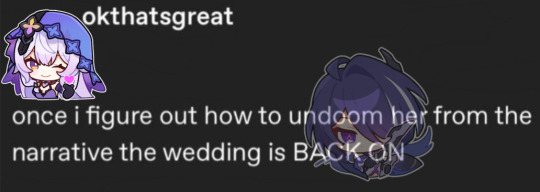

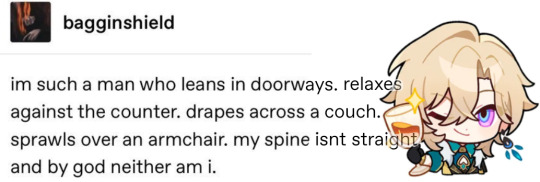
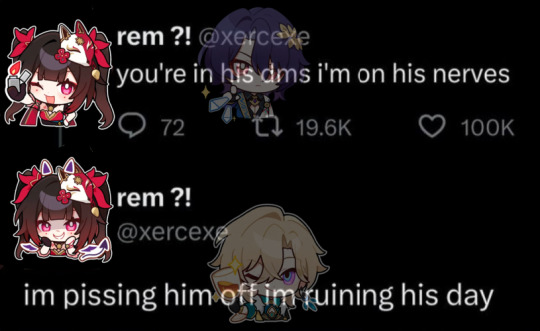
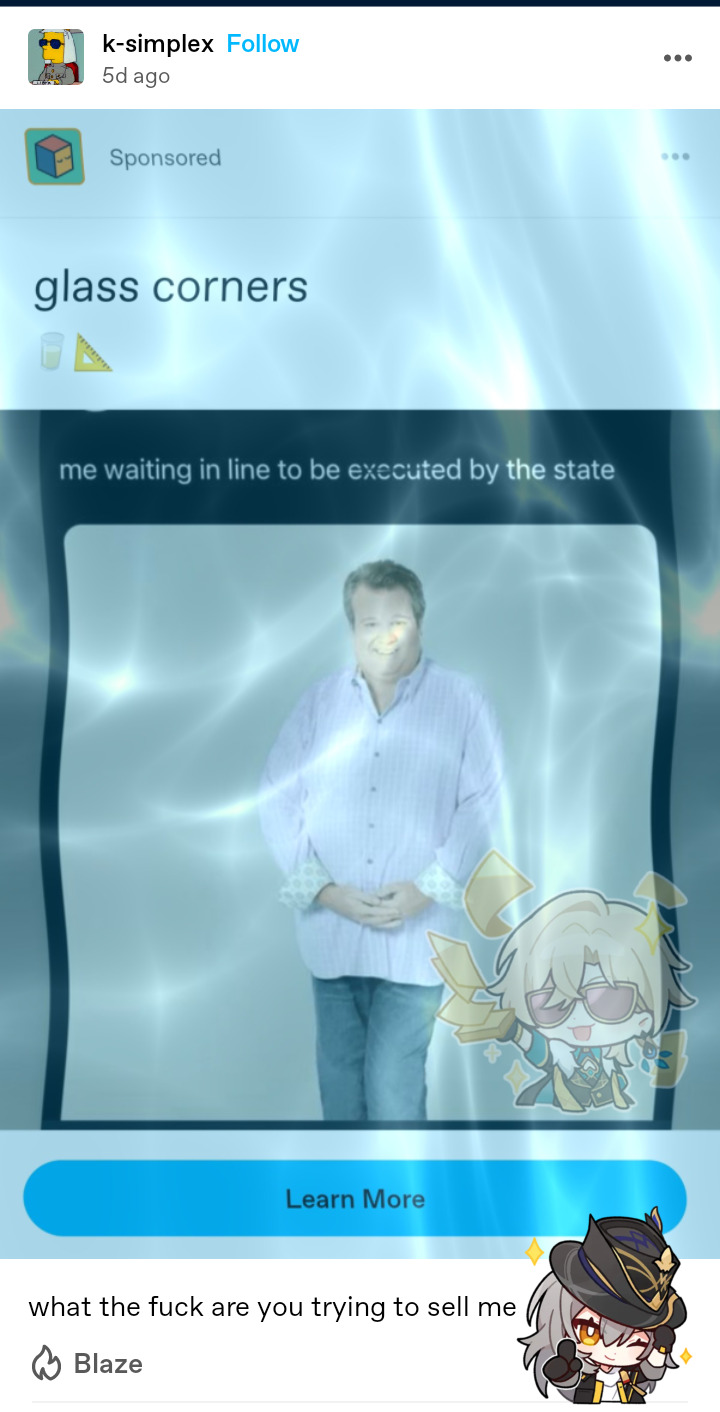




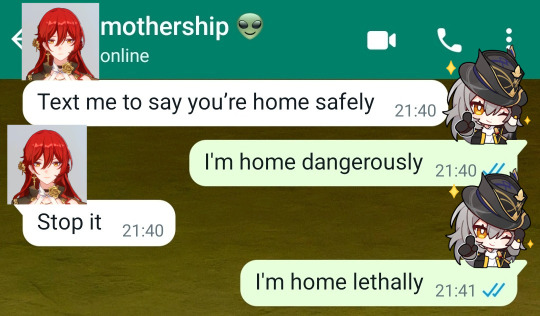


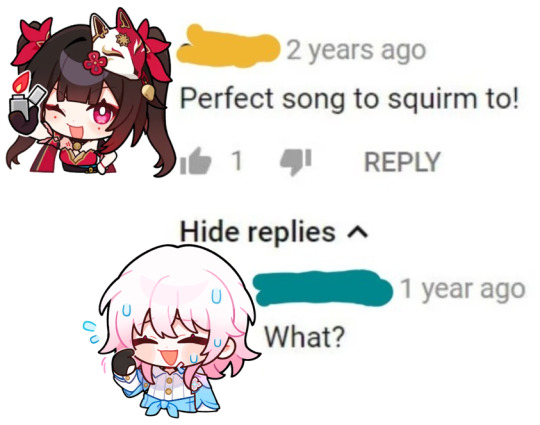
bonus!!!
@shipsarebeautiful did a pull on my account for Robin and GOT ME AN E2 IN ONE PULL.
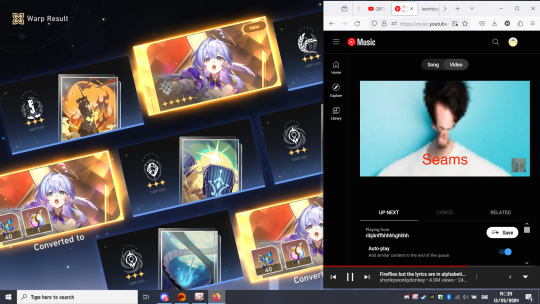
and while THAT song was on!
I made a playlist for our group pulling for fun and that was added for a joke.
THEN THAT HAPPENED.
vin I hope you win every 50/50 ever. sorry I initially cursed you for jinxing Bronya on me. enjoy Clara and your own Robin!
#i managed to do one big fish for stuff! I had some and needed more so I gathered again#i feal i have hit the wall though#i just enjoy this a lot#honkai star rail#honkai star rail memes#hsr robin#hsr boothill#hsr black swan#hsr acheron#hsr acheswan#you know swan has no excuses anymore for how she acts around acheron#hsr sunday#hsr aventurine#THIS JUST FEELS SO REAL FOR THESE TWO#hsr sparkle#hsr ratio#hsr aventio#hsr trailblazer#hsr stelle#hsr caelus#a lot for tb but tb has had a lot of stuff happen recently#hsr gallagher#hsr himeko#hsr firefly#hsr dan heng#hsr march 7th
359 notes
·
View notes
Text
I'll never recover from the fact that the first time we see Logan, he's drunk, lonely and depressed and everyone in his world hates him, while in the last scene he is so happy, having fun with his new friends in his new home. Logan helped Wade save the world but Wade saved Logan.


#he really was a poor little meow meow when wade found him#how does he manage to be so cute and hot in the same time it's unfair#anyways i love his character arc in this movie so so much#hugh jackman deserves all the praise he gets for his brilliant acting#deadpool and wolverine#deadpool & wolverine#logan howlett#Wolverine#wade wilson#Deadpool#Deadpool 3
194 notes
·
View notes
Text
The thing about HotD is that it while it absolutely minimizes the agency and ambition of both Rhaenyra and Alicent, this is specifically used to glorify Rhaenyra and frame her as righteous while condemning Alicent and framing her lacking. That's the key difference in both their textual portrayals that has directly led to 90% of the fandom hailing Rhaenyra as the second coming of Christ while spewing the most hateful vitriol at Alicent just for existing. But y'all are not prepared for that conversation.
#hotd#alicent hightower#pro alicent hightower#anti hotd#I feel like lots of people get the first part (that it strips them off their agency and doesn't allow them to WANT power or revenge;#instead they have to be Good Women Who Always Want Peace)#but don't really understand how the show actually attempts to DO with that#how it uses it to vilify Alicent so badly. She only exists as their special snowflake Rhaenyra's negative foil#they've managed to completely change the character from grrm's books BUT ALSO completely misunderstand how medieval women#actually wielded power and what misogyny at that time would have actually looked like (spoiler: absolutely nothing like this)#anti rhaenyra targaryen#(not really? I just don't trust her fans because some of the hate they've sent me is genuinely deranged)#also:#yes 90% of the fandom is TB and despise Alicent. We know this via surveys conducted by fans and the official marketing team.#y'all need to stop acting like the underdogs here and acknowledge that your Rhaenyra is adored by virtually everyone#(which is OKAY. Just acknowledge it)#you need to also acknowledge how many female characters have been vilified (Alicent) diminished (Laena) or outright erased (Nettles)#to prop up this one entitled white woman#i love rhaenyra from the book and will fight grrm at the shitty way he's portrayed her#but this glorified Good Woman girlboss from the show is driving me nuts
235 notes
·
View notes
Text
LIVESTREAM TONIGHT!
1930 british time!
I'll be chatting about my role as Sharako Lohar in House of the Dragon, including all about the audition process, character creation, and filming. My YouTube audience are a huge part of my acting career so I want to make sure you feel included in this success!
#philosophytube#acting#house of the dragon#sharako lohar#YARRR#also sorry for overriding the democracy of the tumblr poll#my socials manager said and I agreed that it's good to strike while the iron is#hotd#ba dum tssshh#I'll do the postmortem stream on the latest Philosophy Tube probably in a couple weeks when I'm back from Edinburgh
251 notes
·
View notes
Photo

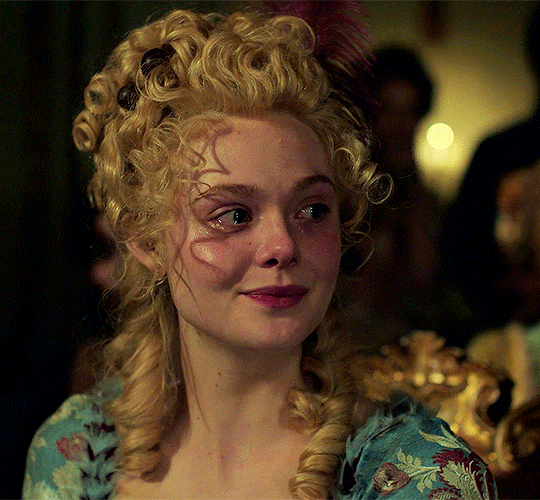

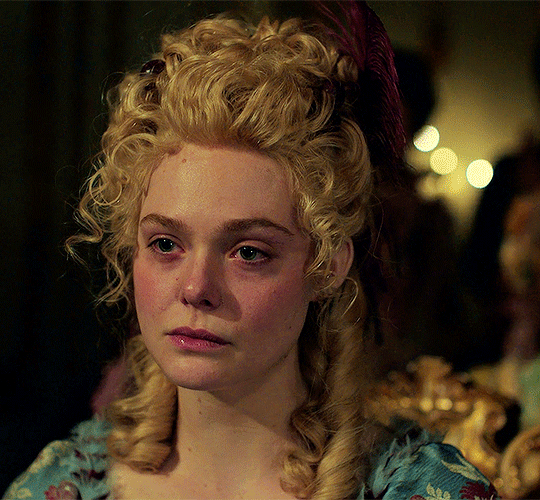
THE GREAT | 3.07 "Fun"
#the great hulu#the great#thegreatedit#the great spoilers#tg spoilers#the great season 3 spoilers#perioddramaedit#catherine the great#elle fanning#huzzahthegreat#thegreatdaily#tvedit#cinematv#hang this sequence in the louvre and acting schools everywhere#bc elle is UNBELIEVABLE#the array of emotions she manages to display and how humanly she does it. I'M SHOOK#mygifs*
2K notes
·
View notes
Text
so, old news obvious news blah blah, but i keep seeing people not getting this about my girl gideon nav so have to say:
i think at first blush, people get the impression that Harrow’s got all the convolutions and layers and hidden vulnerability whereas gideon wears her heart on her sleeve and is just brazenly herself (a loveable rowdy himbo) & that’s the contrast.
and yes, that’s there, but that’s not all. that dynamic itself is a part of their mutual (codependent) front, and like everything else in this book, it gets peeled back.
i think the real contrast is that they’ve both got masks, and those masks are complimentary. they’re both kids who never got a childhood. they grew up tortured in the same place from very different angles with no one but each other to butt heads against. they both had to play-act grown up versions of themselves with few models for what a well-adjusted adult even looked like. so it’s cartoonish. gideon is the plucky hero of her own adventure story that will totally have a happy ending some day, far far away from her nemesis whom she’s totally not in love with. harrow meanwhile (to grossly oversimplify) has to imagine herself as someone cruel and cold enough to cope with being alive at the price of 200 other people. these two things fit very well together. gideon can play the hero to harrow’s villain, and harrow can enact cruelty toward gideon to make herself feel strong and mean (and generally just to vent anguish). the way they hate one another is a kind of mutual protection - it re-enforces the self-image that each of them needs to get through the day. but that’s the coping mechanism. harrow the ruthless bones overlord. gideon the hapless swords idiot, who thinks of nothing but tiddies & sweet sweet vengence (harrow’s corpse in various states of disgrace ) all day. and behind that they’re both tearing apart at the seems beneath caricatures of themselves that are deeply unsustainable and neither of them feels safe letting on the extent to which that’s the case. their hearts are a goddamned mess. neither of them is wearing that shit on their sleeve.
so yeah, there’s a lot more to gideon than being a swords himbo but that’s not the wild thing. the wild thing is she’s so convincing that she somehow manages to sell people on her no braincells act while being the pov character of entire first novel.
-
#[whispers] she doesn't want you to know she has enough braincells to feel trauma]#gideon nav#gideon the ninth#tlt#the locked tomb#come on guys#the himbo act is from the heart and that's why it's so convincing#but she's got a lot of other things going on and the scary thing is#she's capable of burrying them much deeper than harrow has ever managed to bury anything#if she ever decided to go Full Awful it would be truly terrifying & i think we're supposed to Feel That#[spreads hands at both gid's parents]#she's very like both of them and that should be an uncomfortable thought
3K notes
·
View notes